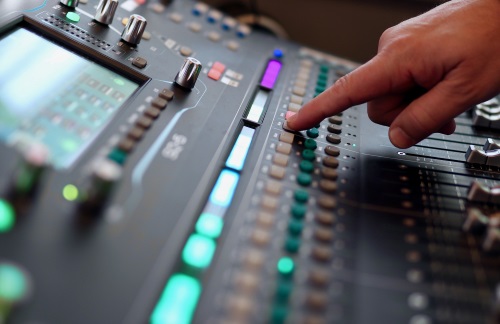ProSoundWeb: It’s not surprising that analog consoles remain in use because of the hat trick that they’re paid for, they’re in place, and operators are used to working with them. Used analog desks also cost a fraction of their original price.
However, modern event production is growing used to the benefits of digital mixers. Here are some reasons why digital consoles win the day in today’s productions.

3 comments:
In my mixing experience, I learned how to mix on a digital desk before I learned how to mix on analog. That being said, I wasn’t even taught how to mix analog, per se, I figured it out on my own based on my experience and knowledge of how a digital desk functions. The benefits of digital consoles as described in the article, as well as a variety of others, make it pretty clear that going digital can be a major time saver, and in the long run, a money saver. That being said, how far will digital technology go? There is already a limited amount of automation that can be implemented in the digital console world, such as being able to switch scenes without having to re patch every channel and reset all the fine tunings. How far will this automation be taken, though? Someday, will we see fully automated desks? Will we only need actual engineers for the physical plugging in of cables and transport of the desks? It seems unlikely, as the human ear for mixing is able to judge the quality of the mix better than technology. The human ear is more adaptable to the slight variations and just knows what sounds right. This would be impossible to replicate in a digital console. That being said, if you go back before digital consoles existed and you told analog engineers what modern consoles are capable of, they would likely look at you like you were crazy.
I have to admit that I'm somewhat bewildered by this article. It systematically and convincingly lays out all the wonderful things about digital sound consoles which were never really in contention. Those that still champion and/or purchase analog sound boards generally agree that function such as preset libraries, scene recall, and all-in-one effects racks and EQs are huge advantages to a digital console. If somebody is buying an analog sound board, they are doing it for one of two reasons; either they do not believe that the advantages afforded by digital are worth the increased price, or they are an analog purist. The author is right: digital consoles are almost always superior to analog boards. But someone who disagrees with that statement isn't going to be persuaded by libraries. They would posit that digital is inherently flawed, that it will never be able to perfectly replicate an analog signal. The author would be better off making the point that new digital desks sample at 196kHz and 32bit, that they use high quality ADCs and DACs to convert the sound going in and out, and that the simple fact is that at quality much higher than 48kHz and 24 bit, the human ear simply can't discern the flaws in the audio. Arguing for analog because of sound quality is like saying that that one flashlight is brighter than another because its light extends into the infrared spectrum. The point isn't that digital boards have functions that analog boards don't. Nobody is arguing with that. The point is that digital audio has reached a high enough quality that its disadvantages are no longer meaningful.
I learned how to mix digitally and applied what I learned to analog when I was in situations to use those consoles. In my experience, I was able to very clearly understand and then reap the benefits of an all digital system. Using a computer to help with your sound reinforcement work can save lots of unnecessary stress because live mixing a show is a very demanding and sometimes draining task. These benefits also can be found when it comes to effects that analog consoles would require external devices for. They are also easy for being versatile for when needed different configurations of channels, equalization, and sends. Having scenes is also very convenient for working. It may come down to the person’s comfort, but the benefits of using a digital console are very apparent and something that would make an audio engineer’s job much easier in the long run once they learn how to use it.
Post a Comment